Connecting remote employees with the organisation is a significant concern for employers. It is hard for them to meet and greet remote employees daily on facetime or similar apps. Remote workers are more self-driven yet face challenges in connecting and collaborating.
Employers sometimes overlook their issues with a conception of their self-driving work attitude. But these employees are more prone to negative emotions.
That is because they are already at a disadvantage: working alone – separately from their teams. This disconnect is more evident where the remote workplace does not integrate with the in-house work culture.
To connect the two and make remote workers feel they belong, uKnowva HRMS is the tool to trust. Know how this tool can manage your existing remote workers proactively daily below.

Strategically-Proven Tactics And Tasks To Make Remote Employees Feel Like A Part Of The Team:
Use the technology to check up on your remote workers consistently.
Checking up on remote employees is crucial to streamline their attitudes in favour of the company culture. You can do so by connecting with them on the uKnowva social intranet.
This platform lets managers centralise all their necessary communication channels and platforms.
In doing so, reporting managers or TLs connect and check up on their workers on time.
This practice must be regular. Be mindful that work-from-home employees also need attention, care, and guidance. They have their own work-life balance to maintain.
However, they also need consistent support from managers whenever required.
For that, managers need to earn their trust. uKnowva employee engagement tool makes the experience from both ends easy and reliable to earn the trust.
Hire your remote workers for value-adding behaviours and skills.
Build a smart remote workplace and culture by hiring talented people based on their skills and behaviours. Do not just give attention to their past experiences or written credentials.
Leverage the assessments on the uKnowva recruitment engine.
Assess each candidate’s performances with respect to their eagerness, truthfulness, motivation, zeal, and passion to work.
The people analytics running at the backend recommends behavioural analysis reports as well. Make use of it by combining it with your conclusions to hire the right people at a favourable cost.
This practice applies to both remote and in-house employees, though. When you hire the right people with integrity, respect, and honesty, managing them is simple. You don’t need to micromanage them.
They complete assigned tasks on time with already harped on skills:
- Time management
- Communications
- Persuasion
- Curiosity and hunger to learn and implement
- Truthfulness
Form a culture of asking questions purposefully from your remote employees.
Managers must know their concerns to make remote employees feel a part of the team. Often such employees do not open up easily or quickly. They need time to observe the culture and tools provided to them.
But managers have to be smart and proactive. They must connect regularly and let them know about a culture that invites more purposeful conversations. The TLs have to ask them questions related to their feedback on the culture.
This has to be a productive exercise, which the uKnowva HRMS network helps achieve. Managers can ask questions from everyone online or personally roll out a survey for a few people.
Either way, RMs and TLs find managing remote employees pretty interesting when they get straightforward responses. These managers learn a lot on the job about their remote workers’ attitudes and perceptions of the firm.
It’s a perfect opportunity for managers to dispel any myths or misconceptions remote employees might have. This practice also helps discern any confusion or negativity inside an employee’s mind.
Open a suggestion box and dedicated helpdesk for all employees.
Give a suggestion box and/or dedicated helpdesk to your employees: remote or anyone else. Let them utilise this feature on the uKnowva HRMS to voice their urgent concerns about the workplace.
This is a smart and empathetic tactic to listen to your employees’ complaints, queries, and ideas. It will improve the company culture when C-suite management takes strategic decisions based on those ideas.
Having a suggestion box also makes employees think creatively. They can indulge in group brainstorming activities before submitting an idea to finetune the working environment.
Remote employees feel heard, respected, and looked after because of these features. Their experience with these advanced tech tools will be noteworthy. And if they use the suggestion box or helpdesk often, mutual trust builds on.
Employees will know they aren’t alone. There is always someone around the corner, or a click away, to address their queries. This way, their workflow will be seamless for timely contributions and appraisals.
Implement uKnowva’s interactive employee engagement tool to extend collaborations.
Another way to build a purposeful remote workplace is to implement a social intranet by uKnowva. This tool has all the necessary features and buttons for teams to connect from across the world.
Teams working in different time zones, remotely, or in-house connect to extend their project collaborations. This could be beneficial for teams in a single business unit or more. As the organisation grows, such a tool comes in handy frequently.
Remote working employees communicate to sharpen their digital skills. They are an active part of the team, as are others on uKnowva’s intranet. There will be no bias, and every employee has an equal opportunity to express their opinions.
There are streams that employers and employees can create. This will enrich each conversation based on thought-provoking topics and projects to complete.
Invite all employees to regular team-bonding activities.
Managing remote employees is tough when there is no connection emotionally between all workers. Managers must build it with the help of creative, innovative, and respectful team-bonding activities.
This could be:
- Announcing monthly winners (MVP) in every department.
- Asking remote workers to rate in-house employees and vice-versa.
- Free luncheons even for remote workers.
- Inviting remote workers on special office tours on specific days to connect with in-house employees.
- Virtual potluck for everyone to come on video and enjoy a meal together like an extended family.
- Joining webinars and training sessions together.
- Joining events like Yoga Day sessions together online.
Note:
The uKnowva team has already celebrated that this year, as a prime example, to treat all workers equally.
Let remote workers and in-house employees work together.
Self-driven remote employees love to work with others as long as they learn something new. Give your employees from every department to work together frequently. This is an example of cross-department or cross-functional training.
When employees (work-from-home + work-from-office) work together, their emotional connection improves. They will automatically start using smart tech tools like uKnowva intranet to connect and deliver projects timely.
They will get to know each other’s strengths and weaknesses. This is an important aspect of exercising relational analytics in the firm.
When employees interact, despite their working location, there are more chances for synergies to unwind faster.
Conclusion:
Making your sincere and new remote employees feel part of the team can be challenging at first. With the uKnowva social intranet tool, we make it possible at every step and process of workforce management.
The same is clear from the blog post above.












